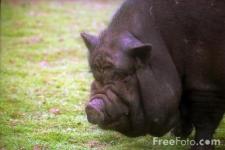The Problem With Super-Muscly Pigs
By Judith Benz-Schwarzburg & Arianna Ferrari,
Slate
| 06. 03. 2016
Animal research is moving rapidly in two divergent directions.
Research on animal cognition, behavior, and welfare is teaching us that many animal species have complex cognitive and emotional lives and needs, which are linked to the way they experience and explore their surroundings. For instance, pigs are quite advanced: They have long-term memory and are sensitive to the emotions of other pigs. They can also use mirrors to locate food behind barriers and can determine whether humans are paying attention to them by looking at people’s heads. There lies a danger in underestimating such capabilities: If animals live in a very restricted environment without any cognitive or social challenges, preventing them from expressing species-typical behavior, they can experience welfare problems. Research insight into animal cognition is giving us—or should be giving us—increased empathy for other species and better recognition of their needs.
At the same time, new gene-editing technologies are allowing scientists to design animals in ways that maximize their economic value as food sources. These technologies permit the direct manipulation of virtually any gene of a living organism...
Related Articles
By Arthur Lazarus, MedPage Today | 01.23.2026
A growing body of contemporary research and reporting exposes how old ideas can find new life when repurposed within modern systems of medicine, technology, and public policy. Over the last decade, several trends have converged:
- The rise of polygenic scoring...
By Stephanie Pappas, LiveScience | 01.15.2026
Genetic variants believed to cause blindness in nearly everyone who carries them actually lead to vision loss less than 30% of the time, new research finds.
The study challenges the concept of Mendelian diseases, or diseases and disorders attributed to...
By David Cox, Wired | 01.05.2026
As he addressed an audience of virologists from China, Australia, and Singapore at October’s Pandemic Research Alliance Symposium, Wei Zhao introduced an eye-catching idea.
The gene-editing technology Crispr is best known for delivering groundbreaking new therapies for rare diseases, tweaking...
By Josie Ensor, The Times | 12.09.2025
A fertility start-up that promises to screen embryos to give would-be parents their “best baby” has come under fire for a “misuse of science”.
Nucleus Genomics describes its mission as “IVF for genetic optimisation”, offering advanced embryo testing that allows...




